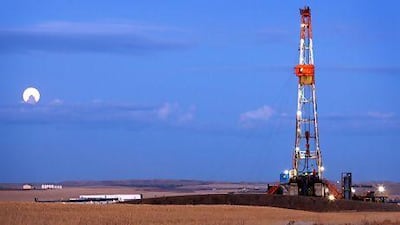"Viva Chávez," Rafael Ramírez, the Venezuelan oil minister, exclaimed as he listed the virtues of the defunct commandante to his fellow ministers at Opec headquarters.
The memoriam set an odd tone as ministers launched their biannual output talks last weekend, reflecting a group more grounded in the past than the present.
Opec's real concern should not be nationalist politics, but the fact that the United States and some other nations may eventually not care.
The rise of fracking technology in North America and the vast oil and gas reserves it has unlocked - North Dakota today pumps as much as Ecuador - makes the issue of Opec supply less of the all-consuming concern it was just a few years ago for Americans. Opec's share of the global market is set to decline as increases in demand are met by North America, according to the International Energy Agency (IEA), the watchdog of the Organization for Economic Cooperation and Development.
Yet faced with the prospect of eroding influence, Opec is taking a wait-and-see approach. Lulled by Brent oil prices of about US$100 a barrel, members chose to keep its output target the same as it has been since December 2011. An informal survey of its leaders reveals a group that is as slow to respond to shale as the wildcatters who drilled in the Bakken, which stretches from central North Dakota into the north-eastern corner of Montana and upwards into Saskatchewan and Manitoba in Canada were quick to exploit the area's resources.
José Maria Botelho de Vasconcelos, the Angolan oil minister: "We need to analyse the situation and then take some decision about that. We need to wait."
Mohammed Al Sada, the Qatari oil minister: "The shale will have a huge impact as a game-changer in the US. How much it will impact the other countries, we still don't know."
Samir Kamal, the Opec governor of Libya: "We are not really concerned."
The sentiment that shale doesn't make a difference to Opec is echoed by Saudi Arabia and the UAE, and the Opec secretariat's formal study of shale commissioned during the weekend meeting is not scheduled for completion until the end of the year. Meanwhile, members are glossing over the differences between African and Gulf Opec nations. Countries such as Angola face the task of replacing American customers with Asian ones. In contrast, Gulf Opec nations can confidently pump away knowing that their oil will be bought by China and its neighbours.
But a decade or two down the road China could follow the same route as America if it is successful in developing its own shale reserves.
"The market has gotten so big," said Alirio Parra, a former oil minister of Venezuela. "The shift in Opec is a shift in interests and markets away from the western hemisphere towards the east, no doubt."
This is already affecting member countries' ability to squeeze more value out of their hydrocarbons by moving downstream. Industrial giants such as Dow Chemical are looking more to American shale gas as an attractively priced feedstock, rather than to the Gulf.
In contrast to the approach of Opec member countries, Saudi Basic Industries Corporation has announced plans to invest in North America, and Abu Dhabi's International Petroleum Investment Corporation has hedged its bets through a company in Canada that is using Pennsylvania and North Dakota shale gas to feed its crackers.
Mr Parra, now a board member of the CWC group, an energy company in London, takes an optimistic view. He believes not only that Opec members such as Algeria and Libya may eventually be able to take advantage of shale reserves at home, but also that Opec will remain relevant.
"I've heard this over the decades, the same thing," he said in the lobby of the Vienna Grand, the old world hotel where Opec delegates, analysts and reporters have mingled on many afternoons.
"Opec is still a point of reference for the world oil industry very much as the IEA is a point of reference. It's the voice of people who are in the upstream with massive resources."
Viva Opec.
ayee@thenational.ae

North American shale boom threatens to erode Opec's influence
Opec has been lulled into taking a wait-and-see approach to the rise of fracking technology in North America and the vast reserves that it has unlocked.
Most popular today
